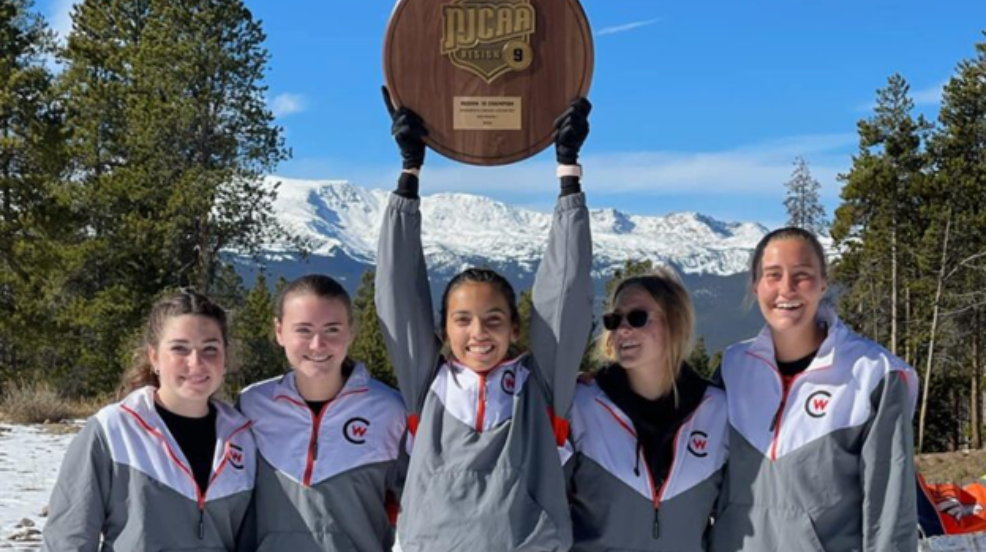Article courtesy of the National Junior College Athletic Association
When Central Wyoming College (CWC) brought basketball back in 2008, two of the women’s team members were sisters Hope and Dani White who are enrolled members of the Northern Arapaho tribe.
“Dani and I always hugged, nodded at one another, and a fist bump before every game and said let’s go. We took care of each other on and off the basketball court,” said Hope. With characteristic Native American humor, she laughs: “We were known as the ‘White Girls!'”
In accordance with traditional values, both now use their education working for the tribe. Dani is a police officer with the Bureau of Indian Affairs and Hope is the Deputy Director for Eastern Shoshone Housing Authority.
“We both serve our community and our people on the reservation we grew up on. Our parents and family have always been our foundation and they have always supported us throughout sporting careers and our current careers. Family is everything to us and we are thankful our parents instilled that quality in us both.”
CWC is surrounded by the Wind River Indian Reservation, home to the Eastern Shoshone and Northern Arapaho tribes. Each year at commencement, one student is recognized as the Outstanding American Indian Scholar. In 2020, that honor went to Jade Ware, a member of the Eastern Shoshone tribe who graduated during COVID with a 4.0 GPA. She came to CWC, however, to play basketball.
“Many of our athletes would not be here if they couldn’t play,” said Steve Barlow, CWC’s athletic director. The relationship between education and sports is especially vital for Native Americans. Generations of trauma delivered through boarding schools have left many tribal members wary of formal education. Basketball was a refuge for young men and women in boarding schools; by the 1920s it was the most popular sport among American Indians, according to Wade Davis, author of Native Hoops. Today, it is arguably impossible to find a community more passionate about the game.
The connection between academics and athletics has brought CWC to having the most sports of any community college in Wyoming, and for the program to have survived significant budget cuts when others in the state trimmed or eliminated their programs. CWC feels strongly that student-athletes are students first and makes sure their athletic careers serve them in the classroom as well.
“Our faculty are our teams’ biggest advocates,” said Dr. Coralina Daly, CWC’s Vice President for Student Affairs, “because they see the benefit.”
For many local Native students, CWC is the preferred option because they can stay close to home and family, and stay connected with their culture. But it is still a leap; many students simply choose not to continue with their education after high school. There are pressures to help family members instead and, especially hard, not to lose their tribal identity and turn into an “apple,” a derogatory term indicating someone is “red on the outside and white on the inside.”
Despite recently earning the federal status of a Native American Serving Non-Tribal Institution (NASNTI), CWC continues to seek ways to increase enrollment of American Indian students. American Indians are vastly underrepresented in higher education. Between ten and fifteen percent of CWC students self-identify as Native American, but the school ranks in the 98th percentile on that metric because most have far fewer.
“It is our job to make sure our American Indian students feel comfortable here, not their job to change to suit us,” said Dr. Coralina Daly, CWC’s Vice President for Student Affairs. Part of that commitment is having a robust athletic program that welcomes Native athletes. “When we started cross country, it was specifically because our reservation students excelled at it and we wanted them here,” said Barlow, who came to CWC after teaching at a reservation school.
CWC’s athletic program has been home to many tribal students, especially in basketball and cross-country. Each coach is onboarded with a clear understanding that our relationship with our local tribes is very important and they are to do what they can to help, said Barlow. For example, when one tribal player was struggling, the coach brought in an elder from the tribe to help the team understand the culture better. Teams visit reservation schools and encourage kids to attend college.
“We try to involve the whole family,” said Barlow. Tribal communities are collectivist rather than individualist, so when one person embarks on an endeavor, all are involved or affected. “It is a blast to see the stands full, which always happens when we have Native students playing,” he added.
CWC requires all staff to participate in training about tribal history, culture, politics, and economics for Wind River. That effort is helped by many others funded by a NASNTI grant to strengthen institutions with high populations of tribal students. In 2022, CWC conferred the first Bachelor of Applied Science (BAS) degrees and among them was an Eastern Shoshone woman who earned hers in tribal leadership.
“We started a BAS program because the tribes asked us to,” said Daly. “We are partners with sovereign nations; their goals are our goals.” The future of tribal student-athletes at CWC is expanding into new realms, including rodeo. The college has also added E-Sports, which is attracting Native competitors.
“When they sign a letter of intent they commit to staying eligible,” said Barlow. “That keeps them in school and gets them graduated.”
NJCAA Equity, Diversity & Inclusion Mission
The NJCAA believes in and is committed to the core values of equity, diversity, and inclusion in intercollegiate athletics and through its structure, programs, legislation, and policies will promote these values among member institutions.
To value diversity is to respect and appreciate its many dimensions including race, ethnicity, culture, age, gender, sexual orientation, gender identity, ability, national origin, veteran status, social-economic class, religion, and the perspective of each individual shaped by experiences, culture and nation. Equity ensures all members have access to the same opportunities to grow, contribute, and develop. To be inclusive is to welcome, value, and bring together the unique backgrounds of individuals to collectively and more effectively provide opportunities to grow for our campus communities and enhance excellence within the Association.
The NJCAA seeks to establish and maintain an inclusive culture that fosters equitable participation for student-athletes and career opportunities for coaches and administrators from diverse backgrounds without being subjected to discrimination.
For more information, visit: NJCAA Equity, Diversity & Inclusion Council News



